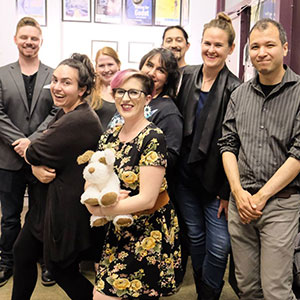

Call it migratory collaboration. This Sunday, thanks to the San Jose Museum of Art and a local literary performance series, Play on Words, an international program of stories will erupt in conjunction with the museum’s current initiative, New Terrains: Mobility & Migration. Whoever registers in advance to attend the literary event won’t have to pay museum admission.
Play on Words began six years ago. To date, the series has migrated through a variety of venues, from Cafe Stritch to Saint James Park, uniting performance artists, actors, theater enthusiasts, fiction writers and community gadflies. Play on Words operates via a submission process similar to literary journals, in that anyone can submit work for consideration: poetry, fiction, essay, one-act play or caustic screed. What’s different is that after the curators choose certain pieces, they put together a program and find other people to perform the works. It’s a spectacular way to see your own work interpreted by someone else.
At the museum, New Terrains connects multiple partnering organizations via a collaborative exploration of how bodies move through social and political spaces in Silicon Valley. The theme can be interpreted literally or metaphorically, in any way, shape or form. As a whole, the project addresses topics like healthy transportation issues, urban planning, public protest, immigration, refugees, text mapping or even Situationist-inspired psychogeography experiments.
For the event this Sunday, Play on Words curated its most diverse program ever, including fiction, nonfiction and poetry that dovetails with the New Terrains project. The stories, which came in from a wide swath of people, are set in Iran, South Korea, India, Serbia, China, Ireland, Mexico and the US. This is not limited to geographical terrain. Other pieces deal with emotional terrain, touching on issues like sexuality or aging. All in all, it’s a giant step forward for Play on Words.
“I’m really proud of all the shows we’ve done, but I’m especially proud of this one,” said Play on Words co-founder Julia Halprin Jackson. “We’re finally getting to a place where we’re reaching people beyond our own network of friends, beyond the immediate downtown San Jose area.”
New Terrains began last year and continues through the spring of 2019, with more than 20 partnering organizations participating in the project, from museums and artist residencies to community centers and civic think tanks. Performances, exhibits, lectures and discussions have already unfolded. It’s like French postmodern philosophy meets the UN Refugee Agency, like NASA meets creek cleaning, like political protest meets art history. Organizations from the SETI Institute to the Mexican Consulate are involved, providing an avant-garde collaborative window into the real Silicon Valley.
All of which exemplifies how the San Jose Museum of Art sees itself as borderless, a facility more open to dialog across disciplines, communities and demographics. Especially with the anti-immigrant political climate continuing to threaten humanity’s rational well-being, more people are uniting to address the issues via art practice.
“People are much more willing to reach out now, and wanting to work together, to meet each other, to stand together as various communities, instead of just speaking to themselves,” said Robin Treen, the museum’s special projects coordinator, adding that the New Terrains project has inspired many valley denizens to prioritize their similarities instead of their differences. In fact, throughout history people from all over the world have settled in San Jose, usually arriving with specific intent, not just showing up because it’s where the train stopped or where their money ran out. “Immigrants built the government structures, the library and everything in San Jose,” Treen said. “And even if those various communities didn’t stick around, they all made big contributions. San Jose was never, ever just a one-culture city.”
Hence, a literary program of new terrains and migration. And perhaps the best example of what Play on Words can accomplish comes in the form of eighth-grader Michelle Qiao’s story, “The City Across the River,” a moving and eloquent tale set in 20th century China that will debut as part of this Sunday’s program. “She mentioned that her English teacher told her to submit,” recalled Halprin Jackson. “I don’t know who her English teacher is, but I thank her.”



